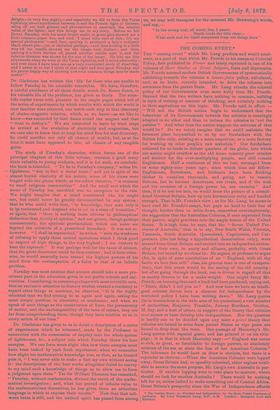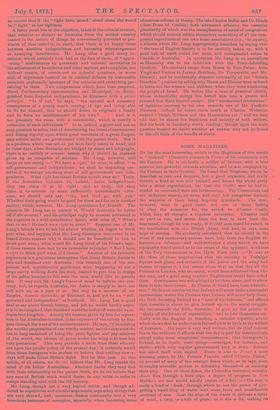THE COMING EVENT"
THE "coming event" which Mr. Lang predicts and would accel- erate, is a part of that which Mr. Fronde in his essays on Colonial Policy, first published in Fraser and lately reprinted in one of his volumes of Short Studies on Great Subjects, fears and deprecates. Mr. Froude accused modern British Governments of systematically exhibiting towards the colonies a laissez-faire policy, calculated, and, as he hints, covertly intended, to drive the colonies into severance from the parent State. Mr. Lang attacks the colonial policy of our Governments even more hotly than Mr. Froude. Beyond that the two writers have nothing in common, nothing in style of writing or manner of thinking, and certainly nothing in their aspirations on this topic. Mr. Froude said, in effect :- "Will not the British nation begin to understand that the behaviour of its Governments towards the colonies is cunningly adapted to no other end than to induce the colonies to ' cut the painter'? And what does the nation suppose the outcome of that would be ? Do we vainly imagine that we could maintain the foremost place bequeathed to us by our forefathers with the British Isles only, existing as a mere emporium, or a mere factory for working up other people's raw materials ? Our forefathers achieved for us lands in distant quarters of the globe, into which our nation might overflow as the old home country grew straiter and straiter for the ever-multiplying people, and still remain Englishmen. Half a continent of this we lost, estranged from us some eighty-nine years ago ; since which time our fellow- Englishmen, Scotchmen, and Irishmen have been flocking thither in countless thousands, and going, not to remain Britons, but to become Americans, our rivals, and if the wish and the occasion of a foreign power be, our enemies." And then, if it be not too late, he would draw the picture of a consoli- dated Greatest Britain, knit up into harmonious unity and bonded strength. That is Mr. Froude's view ; as for Mr. Lang, he seems to have read Mr. Fronde's essays, but pays no heed to their line of thought, further than to write down, somewhat contemptuously, the suggestion that the Australian Colonies, if once separated from their parent, might gravitate into the ample bosom of the United States. It is high time, he says, that the " Seven United Pro- vinces of Australia," that is to say, New South Wales, Victoria, Tasmania, South Australia, Queensland, Capricornia, and Car- pentaria (the last being a hypothetical demarcation only), were severed from Great Britain and erected into an independent nation- ality of their own, in amity and alliance, probably, with Great Britain, but bound by no closer tie. He argues, or professes to argue (for, in spite of some ejaculations of an " England, with all thy faults we love thee still " class, his general tone is one of exaspera- tion), that this event would be the saving of the old country ; but after going through the book, one is driven to regard all that as merely thrown in for a make-weight. One might fancy Mr. Froude, on learning that such a book had been produced, crying out, " There, didn't I tell you so ? And now here we have an intelli- gent colonist driven into a clamour for independence by the wretched policy I have been writing dowu." Mr. Lang quotes (he is tremendous in the wide area of his quotations) a vast number of authorities, Benjamin Franklin, Jeremy Bentham, Grotius, M. Say, and a host of others, in support of the theory that colonies must sooner or later develop into independence. But the question is hardly one to be decided upon any mere a priori theory that colonies are bound to sever from parent States as ripe pears are bound to drop from the trees. One passage of Macaulay's Mr. Lang quotes with especial gusto, and has printed it on his title- page ; it is that in which Macaulay says:—"England was never so rich, so great, so formidable to foreign powers, so absolutely mistress of the sea as since the loss of her American Colonies." The inference he would have us draw is obvious, but there is a rejoinder as obvious :—When the American Colonies were lopped away, Great Britain had, or speedily colonized, other regions avail- able to answer the same purpose, Mr. Laug's own Australia in par- ticular. If another lopping were to take place to-morrow, where should we look for another Australia ? There would be nothing left for us, unless indeed to make something out of Central Africa. Great Britain's prosperity since the War of Independence affords • The Coming Event ; or, Freedom and Independence for the Seven United Provinces of Australia. By John Dunmore Lang, D.D., A.M. London: Sampson Low and Marston. ao constat that if the "tight little island " stood alone she would be " right" in her tightness.
A fairer point lies in the objection, taken in the colonial interest, that colonies so distant as Australia from the mother country cannot in the natare of things be conveniently governed as pro- vinces of that country, in short, that there is no happy mean between absolute independence and harassing mismanagement or annoying interference. Mr. Lang cites a good many in- stances, which certainly look bad on the face of them, of " aggra- / ating" misfeasances by governors and colonial secretaries in
adjustment of boundaries and other matters, and complains, not without reason, of counts-out on colonial questions, or worse still, of arguments insisted on in colonial debates by honourable members profoundly ignorant of the colonies and everything per- taining to them. Two compromises which have been proposed, direct Parliamentary representation and Municipal, as distin- guished from Imperial independence, he dismisses with a petitio principii. "Is it not," he says, " the natural and necessary consequence of a young man's coming of age and being able to do for himself, that he should desire to originate a family and to form an establishment of his own ? . . . . And is it not precisely the same with a community, which is merely a collection of such individuals?" It is, indeed, a grave and not an easy question to solve, that of determining the terms of convenience and fitting dignity upon which great members of a great Empire may subsist under one government with the parent State. But it is a problem which has not as yet been fairly taken in hand, and in these days, when distances are bridged by steam and telegraphs, there is no earthly or oceanic reason why it should be supinely given up as incapable of solution. Mr. Lang, however, still harps on one string :—" We have a right," he cries, in effect, "to self-government and independence ; we shall be degrading our- selves if we accept anything short of self-government and inde- pendence. What right has Great Britain to rule over us ? Truly, if the Australian Colonies do, indeed, desire independence, they can claim it as of right ; and as truly, did they -claim it to-morrow by some sufficiently unmistakable utter- ance, we should only say, " Go, and God go with you." Whether their going would be good for them and for us is another matter, which, however, Mr. Lang postulates for himself. The question Mr. Lang has to answer is, Would Australia be better -off if she severed ? and his principal reply to reasons advanced in the negative is a wild corrobboree dance, with cries of, " What's that to me ? Haven't we a right to sever ?" Suppose one of Mr. Lang's friends were to ask his advice whether he ought to drink port wine, and suppose that Mr. Lang thereupon recounted to his friend divers reasons why it should not be beneficial to him to drink port wine ; what would Mr. Lang think of his friend's logic, if these reasons were met by an invariable rejoinder, " But I have a right to drink port wine, if I choose." Another of his favourite arguments is a gratuitous assumption that Great Britain desires to rule and domineer over Australia ; this reminds one of the sus- picious and apprehensive gentleman who, happening to see a large navvy walking down the road, desired to give him in charge of the police because he felt sure the man would like to garotte him. It may suit Mr. Lang's frame of mind to believe the con- trary, but, as regards Australia, the desire is simply to have her still with us, as a part of us. She may be a member of our Empire, Inutatis mutandis, as Scotland is, and yet be as " self- governed and independent" as Scotland. Mr. Lang has a good deal to say about Scotch history, and yet he would hardly argue, it is to be imagined, that Scotland wouldbe betteroff were she an in- dependent kingdom. Among the reasons given by him for separa, tion in the Australian interest, is the exposure of the colony to dan- gers through the wars of the mother country. He says, " Considering the warlike propensities of our worthy mother, and the character she has so long sustained of being the prize-fighter and pay-mistress of the world, our chance of peace under her wing is at best but very precarious." This may provoke a smile from those who cry out upon the pacific policy of the present day ; it certainly would from those foreigners who profess to believe that nothing now-a- days will make Great Britain fight. But let that pass. In this article, of all others, we do not believe that Mr. Lang speaks the —mind of his fellow Australians; whatever faults they may find with their relationship to the parent State, we do not believe that any race of British stock would desire to slip cable in order to escape standing shot with the old country.
Mr. Lang, though not a very logical writer, and though ad- dicted to repetitions and circular arguments, says many things that are very shrewd, and, moreover, flashes continually into a very humorous terseness of metaphor, especially when bantering some
obnoxious scheme or theory. The late Charles Buller and Dr. Hinds (then Dean of Carlisle) both advocated schemes the essential peculiarity of which was the transplanting of series of emigrations which should contain within themselves something of all the com- ponent ingredients of our own home associations (e.g., the squire), a scheme which Mr. Lang appropriately describes by saying that "the tree of English Society is to be carefully taken up, with a good ball of earth round the roots, and transplanted entire to Canada or Australia." In quotation Mr. Lang is as marvellous as Macaulay was in his interview with the Penn-defending Quakers. His citations range from Moses to Tom Paine ; from Virgil and Tacitus to Jeremy Bentham, De Tocqueville, and Mr. Disraeli ; and he incidentally disposes summarily of the " female franchise" question by asking why Moses and Eleazar were ordered to leave out the women and children when they were numbering the people of Israel. He writes like a man of practical ability, whose indomitable energy has forced him into a groove and jammed him there beyond escape. His " unconcealed intolerance" of opinions contrary to his own reminds one of Mr. Frederic Harrison ; indeed he treats them much as Charles Waterton treated " Dutch William and the Hanoverian rat ;" and we may add that he shares the frankness and honesty of both writers. But his book is decidedly worth reading ; though upon the main question treated we doubt whether an answer may not be found in the old fable of the bundle of sticks.



































 Previous page
Previous page